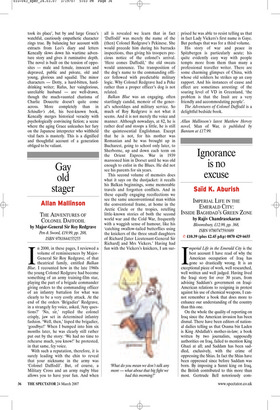Gay old stager
Allan Mallinson
THE ADVENTURES OF COLONEL DAFFODIL by Major-General Sir Roy Redgrave Pen & Sword, £19.99, pp. 208, ISBN 9781844155255 In 2000, in these pages, I reviewed a volume of reminiscences by MajorGeneral Sir Roy Redgrave, of that theatrical family, entitled Balkan Blue. I recounted how in the late 1960s the young Colonel Redgrave had become something of an army training-film star, playing the part of a brigade commander giving orders to the commanding officer of an infantry battalion for what was clearly to be a very costly attack. At the end of the orders ‘Brigadier’ Redgrave, in a strangely fey voice, asked, ‘Any questions?’ ‘No, sir,’ replied the colonel crisply, jaw set in determined infantry fashion. ‘Well, then,’ lisped the brigadier, ‘goodbye!’ When I bumped into him six months later, he was clearly still rather put out by the story: ‘We had no time to rehearse much, you know!’ he protested, in that same, fey voice.
With such a reputation, therefore, it is surely leading with the chin to reveal that your nickname in the army was ‘Colonel Daffodil’. But, of course, a Military Cross and an army rugby blue allows you to have your fun. And when all is revealed we learn that in fact ‘Daffodil’ was merely the name of the (then) Colonel Redgrave’s Pekinese. She would precede him during his barracks inspections, thus giving his troopers precious notice of the colonel’s arrival. ‘Here comes Daffodil,’ the old sweats would announce. The transposition of the dog’s name to the commanding officer followed with predictable military logic. Why Colonel Redgrave had a Peke rather than a proper officer’s dog is not related.
Balkan Blue was an engaging, often startlingly candid, memoir of the general’s schooldays and military service. So much of Roy Redgrave is not what it seems. And it is not merely the voice and manner. Although nowadays, at 82, he is rather deaf and stoops a little, he is still the quintessential Englishman. Except that he is not, for his mother was Romanian and he was brought up in Bucharest, going to school only later, to Sherborne, up and down each term on the Orient Express. War in 1939 marooned him in Dorset until he was old enough to enlist in the Blues. He did not see his parents for six years.
This second volume of memoirs does what it says on the dustjacket: it recalls his Balkan beginnings, some memorable travels and forgotten conflicts. And in these equally engaging recollections we see the same unconventional man within the conventional frame, at home in the Arctic Circle or the tropics, retelling little-known stories of both the second world war and the Cold War, frequently with a waggish sense of humour, like his ‘catching swallow-tailed butterflies using the knickers of the three small daughters of Richard [later Lieutenant-General Sir Richard] and Mrs Vickers.’ Having had fun with the Vickers’s knickers, I am sur prised he was able to resist telling us that in fact Lady Vickers’s first name is Gaye. But perhaps that was for a third volume.
His story of war and peace in Spitzbergen is particularly acute; his quite evidently easy way with people tempts more from them than many a professional traveller writer. There are some charming glimpses of China, with whose old soldiers he strikes up an easy rapport. And his instances of cause and effect are sometimes arresting: of the soaring level of VD in Greenland, ‘the problem is that the Inuit are a very friendly and accommodating people’.
The Adventures of Colonel Daffodil is a delightful bedside book.


















































































 Previous page
Previous page